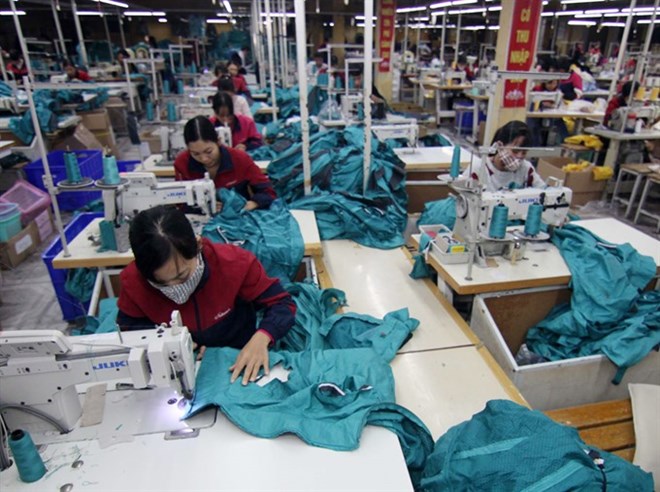With economic results in the first four months of the year below the average performance in previous years as reported by the Government, the National Assembly (NA) is afraid that GDP growth in 2017 can hardly meet the 6.7% target. The NA Economic Committee tentatively put GDP growth this year at 6.3-6.5%.

The NA gave such comments after listening to the Government’s report on the 2017 socio-economic development plan delivered by Deputy Prime Minister Truong Hoa Binh at the third session of the 14th NA which opened on May 22.
“Growth in the first quarter was just 5.1%, the lowest in the same period in several years. (Therefore,) to achieve the economic growth target of 6.7%, the average rate in the remaining quarters should be over 7%.
However, with the actual situation in 2017, this goal is very difficult to accomplish, with probably only 6.3-6.5% attainable,” said Chairman Vu Hong Thanh of the NA Economic Committee.
Results
According to the Government’s report, the consumer price index (CPI) this April picked up 0.9% against December 2016. Credit grew 5.75%, the highest same-period rate in six years.
Exports of manufactured, processed and agricultural goods increased 16.8%. State budget revenue leapt 17.8% and met 32.7% of the yearly estimate.
The industrial production index (IIP) rose an estimated 7.4% last month, higher than in March (5.5%) and the first quarter of 2017 (4.1%), said Deputy Prime Minister Binh. However, the gross domestic product (GDP) growth rate was below expectations.
“GDP growth was 5.1% in the first quarter, lower than the same period last year (5.48%). The IIP in the first four months edged up 5.1%, mainly due to a 9.7% contraction in the mining sector, with crude oil falling 14.2%.
The manufacturing and processing of electronic components grew less than in the same period last year. The distribution and allocation of public investment funds is slow,” he said.
As of April 20, the total money supply had increased 3.78% over December 2016 (versus 4.54% year-on-year).
Total deposits in credit institutions had risen 3.39% against the end of last year (versus 4.01%), while credit had gone up 4.86% over December 2016, and 2.99% against the same period last year.
International tourist arrivals in the first four months of 2017 surged 30.3% year-on-year to some 4.3 million.
January-April exports totaled US$62.09 billion, up 16.8% over the same period last year, while imports amounted to nearly US$64 billion, a surge of 24%, resulting in a trade deficit of US$1.91 billion in the first four months, accounting for 3.1% of export turnover.
Slow economic restructuring
Following the presentation by Deputy Prime Minister Binh, Chairman Vu Hong Thanh of the NA Economic Committee delivered the NA’s assessment report on the aforesaid results.
Thanh said that realizing the economic growth as targeted by the Government looks unattainable.
He suggested that a number of policies be adopted to remove difficulties and maintain macroeconomic stability at the same time, and continue to promote growth quality and sustainability, rather than attaching importance to growth.
Low growth in the first quarter is ascribed to the shift in the growth model, slow economic restructuring, heavy dependence on the mining industry, the lack of a new driving force replacing this shrinking sector and the failure to fully tap the home market.
Thanh asked the Government to weigh how a lower GDP growth rate would affect other indicators such as public debt and budget overspending.
Besides, it is necessary to give a second thought to a boost of crude oil pumping and mining activities in order to attain the growth target.
It is concerned that the trade deficit is high. Therefore, from now to the end of the year, the factors behind the trade deficit must be thoroughly considered to make flexible adjustments.
Despite the average CPI rise of 4.8% in the past four months over the same period in 2016, there is concern that inflation in 2017 may be higher than the target approved by the NA.
Considerable budget deficit and public debt are continuing to put pressure on debt repayment and pose risks to sustainable economic development.
Budget spending on capital investment in four months reached 19.2%, a low level, putting pressure on disbursement in the final months of the year, a situation that has occurred for many years with no remedies.
Solutions
Deputy Prime Minister Truong Hoa Binh on behalf of the Government proposed a number of solutions be adopted in the coming time to meet the set targets.
These include control of credit growth associated with credit quality improvement, credit expansion for production and business, bad debt settlement coupled with the restructuring of weak banks, and a gradual reduction of lending rates for production and business.
The Government will continue to strengthen controls on public debt, with resources to be allocated for full repayment on schedule.
Technical solutions will be implemented to achieve a higher crude oil output than the plan assigned by the Prime Minister.
In addition, agricultural restructuring will be sped up to ensure higher efficiency. Further efforts will be given to restore production and fisheries in areas affected by marine environmental incidents.
Deputy Prime Minister Binh also placed emphasis on assisting business development, promoting the development of services and markets at home.
Thanh said the NA Economic Committee basically agreed with the solutions proposed by the Government. Still, the committee wants due attention to be paid to a number of innovative solutions for institutional reform, and long-term policy changes such as selective FDI attraction.
The Government needs flexible monetary policy, concentrate credit on manufacturing, restrict unsustainable credit and that for real estate investment, and offer enterprises favorable conditions to access bank loans with reasonable interest rates.
The NA Economic Committee also asked the Government to tighten fiscal policy, strengthen fiscal discipline, cut overspending, reduce public debt, closely control lending to those repaying foreign loans and improve the efficiency of using loans.
SGT